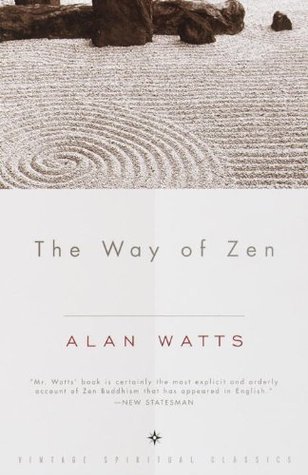What do you think?
Rate this book


256 pages, ebook
Published February 16, 2011
In terms of immediate perception, when we look for things there is nothing but mind, and when we look for mind there is nothing but things. For a moment we are paralyzed, because it seems that we have no basis for action, no ground under foot from which to take a jump. But this is the way it always was, and in the next moment we find ourselves as free to act, speak, and think as ever, yet in a strange and miraculous new world from which “self” and “other,” “mind” and “things” have vanished. In the words of Te-shan:
Only when you have no thing in your mind and no mind in things are you vacant and spiritual, empty and marvelous.
In Zen a man has no mind apart from what he knows and sees, and this is almost expressed by Gochiku in the haiku:
The long night;
The sound of the water
Says what I think.
And still more directly–
The stars on the pond;
Again the winter shower
Ruffles the water.
Haiku and waka poems convey perhaps more easily than painting the subtle differences between the four moods of sabi, wabi, aware, and yugen. The quiet, thrilling loneliness of sabi is obvious in
On a withered branch
A crow is perched,
In the autumn evening.
But it is less obvious and therefore deeper in
With the evening breeze,
The water laps against
The heron’s legs.
In the dark forest
A berry drops:
The sound of the water.
Sabi is, however, loneliness in the sense of Buddhist detachment, of seeing all things as happening “by themselves” in miraculous spontaneity. With this goes that sense of deep, illimitable quietude which descends with a long fall of snow, swallowing all sounds in layer upon layer of softness.
Sleet falling;
Fathomless, infinite
Loneliness.




``It should be obvious that what we are, most substantially and fundamentally, will never be a distinct object of knowledge. Whatever we can know-life and death, light and darkness, solid and empty- will be the relative aspects of something as inconceivable as the color of space. Awakening is not to know what this reality is. As a Zenrin poem says:
As butterflies come to the newly planted flowers,
Bodhidharma says, `I know not.'
Awakening is to know what reality is not. It is to cease identifying oneself with any object of knowledge whatsoever. Just as every assertion about the basic substance or energy of reality must be meaningless, any assertion as to what `I am' at the very roots of my being must also be the height of folly. Delusion is the false metaphysical premise at the root of common sense; it is the average man's unconscious ontology and epistemology, his tacit assumption that he is a `something.' The assumption that `I am nothing' would, of course, be equally wrong since something and nothing, being and non-being, are related concepts, and belong equally to the `known.'"
Like a sword that cuts, but cannot cut itself
Like an eye that sees, but cannot see itself
Al contrario, cercare di diventare Budda significa negare che si è già Budda e questa è la sola base su cui non si possa realizzare la Buddità! In breve, per diventare Budda è solo necessario aver fede che si è di già Budda. Shinran, il grande esponente cinese della Terra Pura, giunse perfino a dichiarare che bastava semplicemente ripetere il Nome, avendo capito che il tentativo di compiere un atto di devozione era troppo artificiale, e portava a dubitare della propria fede.
Connessa, allora, con la ricerca del bene è la ricerca del futuro, l'illusione per la quale noi siamo incapaci di essere felici senza un "futuro lusinghiero" per il simbolico io. Il progresso verso il bene è perciò misurato sulla lunghezza della vita umana, dimenticando che nulla è più relativo del nostro senso della lunghezza del tempo. Una poesia zen dice:
La gloria del mattino che risplende per un'ora Non differisce in sostanza dal pino gigante, Che vive mille anni.
Soggettivamente, un insetto sente senza dubbio che il suo breve periodo di qualche giorno è una durata di vita ragionevolmente lunga. Una tartaruga, con la sua durata di parecchie centinaia di anni, sentirebbe soggettivamente lo stesso. Non tanto tempo fa la vita media dell'uomo era di circa quarantacinque anni. Oggi va dai sessantacinque ai settanta anni, ma soggettivamente gli anni sono più veloci, e la morte, quando viene, arriva sempre troppo presto
Non si deve dimenticare il contesto sociale dello zen. Esso è principalmente una via di liberazione per coloro che hanno superato le norme della convenzione sociale, del condizionamento dell'individuo da parte del gruppo. Lo zen è una medicina per i sinistri effetti di questo condizionamento, per la paralisi mentale e per l'ansietà che provengono da un'eccessiva coscienza di sé. Lo si deve guardare contro lo sfondo di società regolate dai principi del confucianesimo, con il loro greve accento sulla convenzione sociale e su un rituale minuziosamente formalista. In Giappone, inoltre, esso dev'essere considerato in riferimento alla rigida educazione richiesta nell'addestramento della casta samurai, e alla tensione emotiva cui i samurai erano sottoposti in tempi di guerra costante. Quale medicina per queste condizioni, lo zen non cerca di sovvertire le stesse convenzioni, ma le dà invece per scontate: si notino, per esempio, certe manifestazioni dello zen come il cha-no-уи о "сеrimonia del tè" in Giappone. Lo zen potrebbe quindi rivelarsi una medicina assai pericolosa in un contesto sociale in cui la convenzione sia debole o, all'estremo opposto, dove esista uno spirito di aperta rivolta contro la convenzione, pronto a sfruttare lo zen per scopi distruttivi